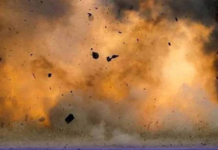Offenses such as attacking military installations and buildings, even by civilians, are considered unlawful according to the Pakistan Army Act of 1952. Interestingly, this act also encompasses offenses like entering prohibited areas as outlined in the Official Secrets Act of 1923.
According to government sources, the military courts will handle the prosecution of the planners, instigators, and perpetrators involved in the attacks on defense installations, buildings, monuments, and similar targets on May 9. These individuals will be tried under the provisions of the Army Act of 1952 and the Official Secrets Act of 1923.
These sources further indicate that the military authorities do not require explicit permission or approval from the federal government to prosecute individuals who have committed offenses under these two acts. The existing military courts, operating under the Army Act, are part of the country’s judicial system, and numerous civilian defendants have been tried under this act.
Section 2(d) of the Pakistan Army Act of 1952 covers the application of this law to individuals who are not members of the defense forces. This section provides detailed information and states that individuals who are not otherwise subject to the act shall be subject to it if they are accused of committing an offense under the Official Secrets Act of 1923 in relation to any defense-related work, arsenal, naval, military or air force establishment or station, ship, aircraft, or any other offense concerning the naval, military, or air force affairs of Pakistan. The Army Act also encompasses offenses related to attacking military installations. It should be noted that the Army Act, as mentioned earlier, also covers individuals who commit offenses under the Official Secrets Act.
Upon reviewing the Official Secrets Act of 1923, which encompasses various types of offenses, it is evident that the act comes into effect when any person approaches, inspects, passes over, or is in the vicinity of a prohibited place for purposes detrimental to the safety or interests of the state. Offenders of such actions can face imprisonment for up to 14 years.
During the recent special corps commanders’ conference, presided over by Chief of Army Staff General Asim Munir at GHQ, it was decided that those responsible for the attacks on military installations, personnel, and equipment during the violence on May 9 would be prosecuted under the relevant laws of the Pakistan Army, including the Pakistan Army Act and the Official Secrets Act. This announcement sparked a debate within the media and political circles regarding the validity of such a decision. Some argue that it may violate the Constitution, while others confuse the Army Act with previous legislation related to military courts.







